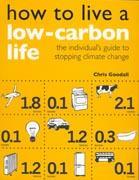Vicky Wong reviews this upbeat guide to reducing your carbon emissions
How to live a low-carbon life - the individual's guide to stopping climate change
Chris Goodall
London: Earthscan 2007 | Pp319 | £14.99 | ISBN 1 844 07426 6

This book is exactly what the title says it is. In his introduction the author explains why he thinks that expecting governments to lead the way on reducing carbon emissions is rather optimistic. He then discusses the major sources of energy use and thus carbon emissions in everyday life, and how we as individuals can act to reduce them.
The tone of the book is surprisingly upbeat considering that a reduction in carbon emissions from the UK personal average of ca 12 tonnes per year to three is recommended to keep climate change to an acceptable level. There are several very interesting sections, including a look at the 'extra-ordinary cheapness of fossil fuels', which considers the problem of reducing emissions from an unusual angle. There is also a discussion of the energy efficiency implications of the UK's policy of switching from analogue to digital television and a series of calculations to show whether walking or driving is more energy efficient for short journeys (less than two miles). The answer is rather unexpected, though I am not sure I fully agree with Goodall's reasoning.
While overall a good read and very informative, I do have concerns with a few points in the text. Goodall is very keen to suggest changing an old central heating boiler to a condensing one, even if the old one does not need replacing, as a way of cutting emissions. He, however, does not discuss the emissions involved in the manufacture of the boiler, except with a brief note with regard to oil-fired boilers. He does take up this point when discussing smaller appliances such as washing machines, however. He also proposes the consumption of organic food where possible, but does not examine whether this is feasible for a planet with nearly six billion people on it.
Overall, the majority of the book is probably best suited as background reading for teachers, but it's readable style would make it accessible to interested school students. With changes to the National Curriculum to include more emphasis on climate change, this could prove a useful addition to a school library.






No comments yet